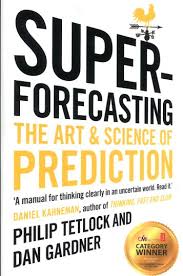Superforecasting
Перейти к навигации
Перейти к поиску

Superforecasting: The Art and Science of Prediction is a future focused book by Philip E. Tetlock and Dan Gardner that describes a set of methods to improve forecasting abilities.
The book draws on:
- Results from four years of online competitions for forecasters held under the Aggregative Contingent Estimation project of IARPA (Intelligence Advanced Research Projects Activity)
- Reflections from contest participants whose persistently scored highly in the competition - people who became known as 'superforecasters'
- Insight from the Good Judgement Project co-created by Philip E. Tetlock
- Reviews of the accuracy of predictions made publicly by politicians, political analysts, and media figures
- Other research into decision-making, cognitive biases, and group dynamics.
Forecasters and superforecasters from the Good Judgement Project submitted more than 10,000 predictions over four years in response to questions about the likelihood of specified outcomes happening within given timescales over the following 3-12 months. Forecasts addressed the fields of geopolitics and economics.
Characteristics of superforecasters[править]
The book highlights the following characteristics as being the cause of the success of superforecasters:
- Avoidance of taking an ideological approach, which restricts the set of information that the forecaster considers
- Pursuit of an evidence-based approach
- Willingness to search out potential sources of disconfirming evidence
- Willingness to incrementally adjust forecasts in the light of new evidence
- The ability to break down estimates into a series of constituent questions that can, individually, be more easily calculated
- The desire to obtain several different perspectives on a question, which can then be combined into an aggregate viewpoint
- Comfort with mathematical and probabilistic reasoning
- Adoption of careful, precise language, rather than vague terms (such as "might") whose apparent meaning can change with hindsight
- Acceptance of contingency rather than 'fate' or 'inevitability' as being the factor responsible for outcomes
- Avoidance of 'groupthink' in which undue respect among team members prevents sufficient consideration of alternative viewpoints
- Willingness to learn from past forecasting experiences - including both successes and failures
- A growth mindset, in which personal characteristics and skill are seen as capable of improvement, rather than being fixed.
Edge Master Class in Superforecasting[править]
Edge has published a series of videos of five "master-classes" taught by Philip Tetlock on the subject of superforecasting:
- Forecasting Tournaments: What We Discover When We Start Scoring Accuracy
- Tournaments: Prying Open Closed Minds in Unnecessarily Polarized Debates
- Counterfactual History: The Elusive Control Groups in Policy Debates
- Skillful Backward and Forward Reasoning in Time: Superforecasting Requires "Counterfactualizing"
- Condensing it All Into Four Big Problems and a Killer App Solution